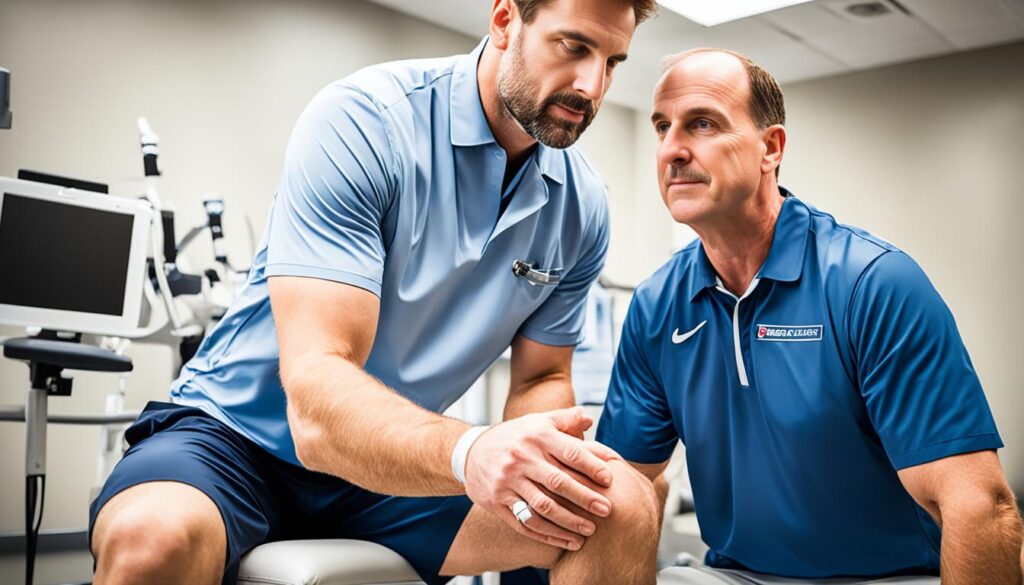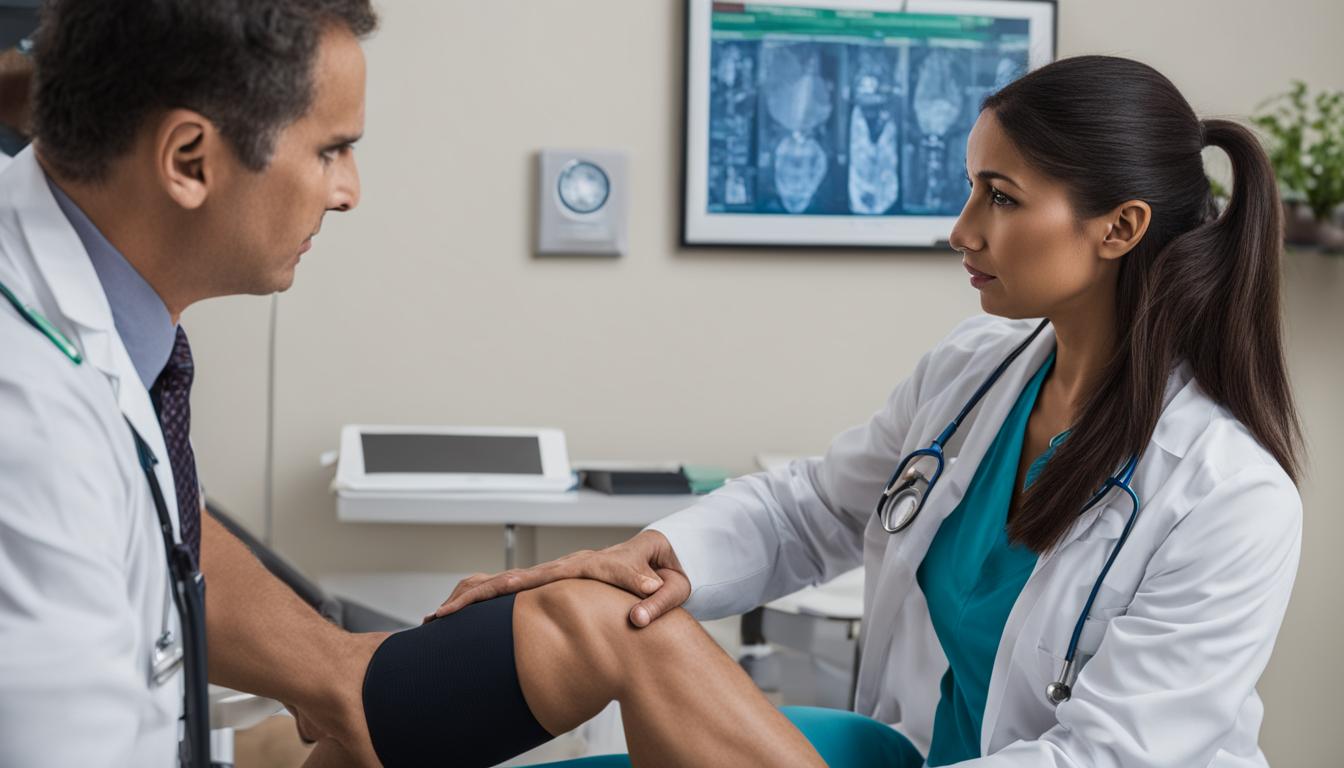Knee pain is a common issue that affects millions of people worldwide. Did you know that more than 100 million Americans suffer from knee pain at some point in their lives? It is a staggering statistic that highlights the widespread impact of this condition. If you are experiencing knee pain, finding the right specialist is crucial for accurate diagnosis and effective treatment.
At the Noyes Knee Institute, we understand the importance of finding the right medical professional to address your knee pain. Our team consists of experts in the field, including orthopedic knee surgeons, sports medicine specialists, and physical therapists. We are dedicated to providing the highest level of care and helping you find relief from knee pain.
So, who should you see for your knee pain? The answer depends on the severity and underlying cause of your condition. General practitioners are often the first doctors to visit for knee pain. They can conduct a thorough examination, order necessary tests, and provide conservative treatments.
General Practitioner
When experiencing knee pain, the first healthcare professional to consult is a general practitioner, also known as a family doctor or primary care physician. These doctors are equipped to assess and provide initial care for a wide range of health concerns, including knee pain.
During your appointment with a general practitioner, they will conduct a thorough medical history and physical examination to diagnose the underlying cause of your knee pain. In some cases, they may also order diagnostic tests such as X-rays or MRIs to confirm the diagnosis or rule out other potential causes.
General practitioners often recommend conservative treatments for knee pain, which focus on relieving symptoms and promoting healing without surgical intervention. These conservative treatments may include:
- Rest: Taking a break from activities that aggravate the knee, allowing it time to heal.
- Ice: Applying ice packs to the affected area to reduce pain and inflammation.
- Compression: Using compression bandages or knee sleeves to provide support and reduce swelling.
- Elevation: Keeping the affected leg elevated to reduce swelling.
- Nonsteroidal anti-inflammatory drugs (NSAIDs): Medications like ibuprofen or naproxen to alleviate pain and reduce inflammation.
- Physical therapy exercises: Engaging in specific exercises designed to strengthen the muscles around the knee and improve flexibility and range of motion.
In addition to these conservative treatments, general practitioners may also provide lifestyle recommendations to support knee health. For instance, if excess weight is contributing to knee pain, they may suggest a weight loss plan to alleviate stress on the knee joint.
While general practitioners play a crucial role in the initial diagnosis and treatment of knee pain, there may be instances where more specialized care is necessary. If the knee pain is severe, does not respond to conservative treatments, or requires further evaluation, your general practitioner may refer you to a knee pain specialist for more specialized care.
“General practitioners are often the first point of contact for patients with knee pain. Their comprehensive approach to diagnosis and conservative treatment options can help many individuals find relief and start the path to recovery.”

Sports Medicine Specialist
Sports medicine specialists play a crucial role in the diagnosis, treatment, and prevention of knee injuries related to sports and exercise. At the Noyes Knee Institute, our team of sports medicine experts is dedicated to providing customized care to athletes and individuals with active lifestyles.
When it comes to knee injuries, our specialists have extensive knowledge and experience in developing personalized treatment plans tailored to each patient’s needs. From amateur athletes to professional sportspeople, we understand the unique demands placed on the knee joint and the importance of a comprehensive approach to recovery.
Whether it’s a sprained ligament, a torn meniscus, or a stress fracture, our sports medicine specialists are equipped to handle a wide range of knee injuries. We utilize the latest diagnostic tools and techniques to accurately assess the extent of the injury and create an effective treatment plan.
In addition to providing top-notch medical care, our sports medicine specialists also emphasize injury prevention. We work closely with athletes to develop customized training programs that focus on strengthening the knee joint, improving flexibility, and enhancing overall performance. We provide guidance on proper nutrition, rest, and recovery techniques to reduce the risk of future injuries.
Our goal is to help you recover from knee injuries and get back to your favorite sports and activities as quickly and safely as possible.

Benefits of Seeing a Sports Medicine Specialist:
- Expertise in diagnosing and treating knee injuries related to sports and exercise
- Customized treatment plans tailored to individual needs
- Access to the latest medical advancements and diagnostic tools
- Comprehensive approach to injury prevention
- Collaboration with other healthcare professionals to ensure holistic care
Testimonial:
“After suffering a knee injury while playing soccer, I was referred to a sports medicine specialist at the Noyes Knee Institute. Their expertise in treating knee injuries and their personalized treatment plan helped me recover quickly. Thanks to them, I’m back on the field doing what I love!” – Emily, recreational soccer player
Physical Therapist
Physical therapists are highly trained professionals who specialize in improving, maintaining, or restoring knee function and mobility. At Noyes Knee Institute, our team of experienced physical therapists is dedicated to providing personalized care and treatment plans tailored to each patient’s unique needs.
When you visit our clinic, our physical therapists will conduct a comprehensive evaluation to assess your knee condition and identify any underlying issues. This evaluation may include a range of assessments, such as assessing your range of motion, strength, and balance.
Based on the evaluation results, our physical therapists will develop a personalized treatment plan to address your specific goals and challenges. This plan may include a combination of therapeutic exercises, manual therapy techniques, and other modalities to reduce pain, swelling, and inflammation. Our physical therapists will guide you through each step of your treatment and monitor your progress closely.
Physical therapy plays a crucial role in the post-surgery rehabilitation of patients with knee pain. Our physical therapists work closely with our orthopedic knee surgeons to develop comprehensive rehabilitation programs designed to optimize your recovery and restore your knee function.
In addition to rehabilitation, our physical therapists also focus on educating patients on proper techniques for activities such as walking, running, and other movement patterns. They provide guidance on proper body mechanics and posture to reduce the risk of further injury or aggravation of the knee.
At Noyes Knee Institute, we are committed to providing the highest level of care and expertise to help you regain your knee function, mobility, and overall quality of life. Our physical therapists are an integral part of our multidisciplinary team, working together with our orthopedic knee surgeons and other specialists to ensure you receive personalized, evidence-based treatment.
Orthopedic Knee Surgeon
Orthopedic knee surgeons are specialized doctors who diagnose and treat musculoskeletal conditions, focusing specifically on injuries and diseases of the knee. Our team of orthopedic knee surgeons at the Noyes Knee Institute has extensive training and experience in diagnosing and managing various knee problems, providing comprehensive care for individuals suffering from knee pain.
In order to accurately evaluate the condition of the knee joint, our orthopedic knee surgeons utilize advanced diagnostic imaging techniques such as X-rays and MRIs. These imaging tools allow us to obtain detailed information about the structures and tissues within the knee, aiding in the precise diagnosis of musculoskeletal conditions.
At the Noyes Knee Institute, we believe in personalized treatment plans that cater to the unique needs of each patient. Depending on the nature and severity of the knee condition, our orthopedic knee surgeons may recommend non-surgical interventions, such as physical therapy, medication, or injections. These approaches aim to alleviate pain, reduce inflammation, and improve knee function without the need for invasive procedures. However, in cases where surgery is necessary, our skilled orthopedic surgeons are proficient in a range of surgical procedures, including arthroscopic surgery and joint replacement surgery, to repair or reconstruct damaged knee structures.
With our expertise and dedication, we are equipped to provide specialized care for even the most complex knee conditions. Whether you are dealing with chronic knee pain, an acute injury, or a degenerative knee disease, our orthopedic knee surgeons are committed to helping you regain your mobility, alleviate pain, and improve your quality of life.
FAQ
Who should I see for knee pain?
Depending on the severity and underlying cause of your knee pain, you may consider visiting a general practitioner, sports medicine specialist, physical therapist, or orthopedic knee surgeon. They can provide accurate diagnosis and appropriate treatment based on your specific condition.
What can a general practitioner do for knee pain?
General practitioners, also known as family doctors or primary care physicians, can conduct a thorough medical history and physical examination to diagnose knee pain. They may order diagnostic tests such as X-rays or MRIs. Treatment options may include conservative measures such as rest, ice, compression, elevation (RICE), nonsteroidal anti-inflammatory drugs (NSAIDs), or physical therapy exercises. Lifestyle recommendations such as weight loss to reduce stress on the knee joint may also be provided.
How can a sports medicine specialist help with knee pain?
Sports medicine specialists are trained in treating and preventing sports-related injuries, including knee pain. They develop customized treatment plans to help patients recover and return to their activities safely. Additionally, they focus on injury prevention, developing personalized training programs and providing guidance on nutrition, rest, and recovery techniques to minimize the risk of future knee injuries.
What can a physical therapist do to alleviate knee pain?
Physical therapists specialize in improving knee function and mobility. They develop personalized treatment plans based on a comprehensive evaluation. Treatment may include exercises, manual therapy, and other modalities to reduce pain, swelling, and inflammation. Physical therapists also provide post-surgery rehabilitation and educate patients on proper techniques for daily activities to prevent further knee injury or aggravation.
How can an orthopedic knee surgeon treat my knee pain?
Orthopedic knee surgeons diagnose and treat musculoskeletal conditions, including knee injuries and diseases. They utilize diagnostic imaging such as X-rays or MRIs to evaluate the knee joint. Treatment plans are tailored to the patient’s needs and may include non-surgical interventions such as physical therapy, medication, or injections. If necessary, orthopedic surgeons can perform various surgical procedures to repair or reconstruct damaged knee structures, including arthroscopic surgery or joint replacement surgery.

Leave a Reply